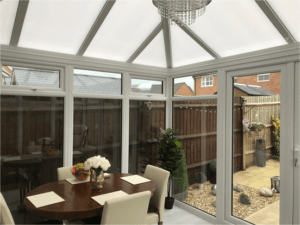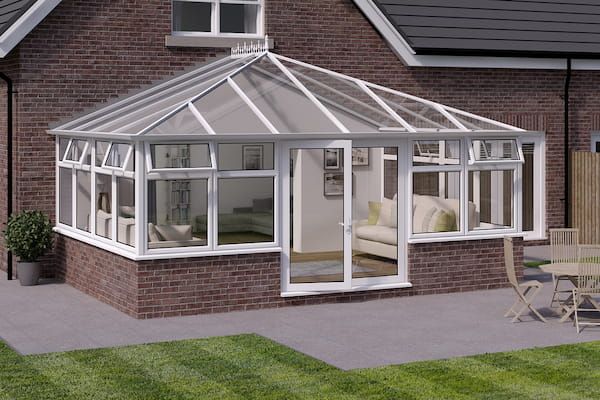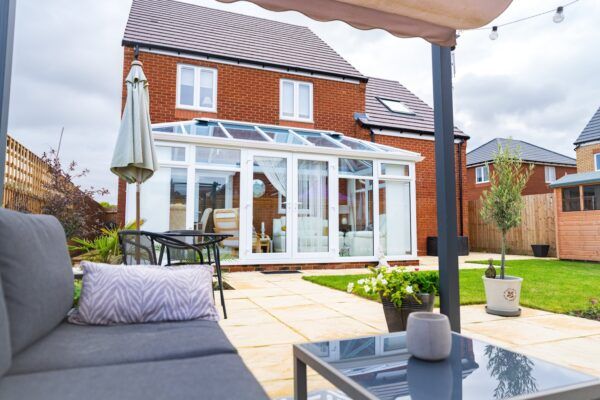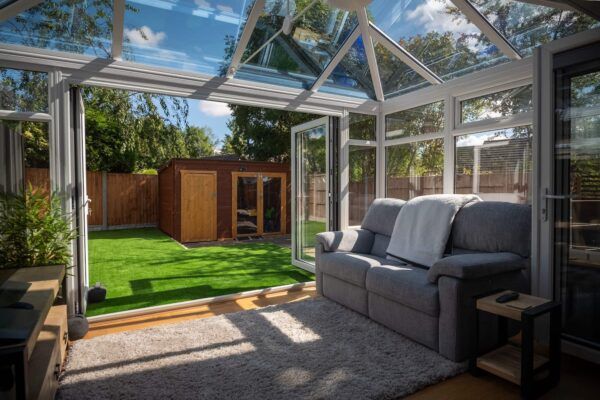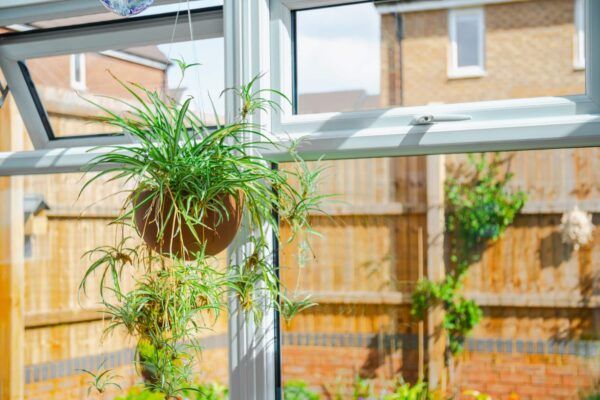Many people prefer tiled conservatory roofs over glass or polycarbonate roofs to maximise comfort and energy efficiency.
A solid conservatory roof suits different property styles and budgets. There are a variety of tile roof options to choose from, including lightweight metal tiles, synthetic plastic tiles or tile effect sheets.
Installing a new tiled roof is often more challenging and costly than replacing a polycarbonate or glass roof on your conservatory. This is because a solid roof significantly changes your conservatory, and essentially transforms your build from a temporary structure into a permanent extension.
A tiled roof may be the right option if you want to invest a little extra to create a permanent extension on your home, whether you’re replacing an existing conservatory roof or designing a brand new project.
We’ll explore the pros and cons of a tiled conservatory roof, as well as some alternative options in this guide.
Tiled roof conservatory building regulations
Replacing an old glass or polycarbonate conservatory roof with a new solid tiled roof does not need planning permission, but it does require building regulatory approval. This is because adding a solid roof to your conservatory changes its classification from a ‘temporary’ structure to a ‘permanent’ extension.
Your conservatory will need to be assessed to ensure that it can adequately handle the weight of a solid roof. It may be necessary to adjust the structure so that your conservatory can support the new roof safely and complies with relevant building regulations.
These changes could include adding extra batons or rafters for additional support, changing windows and doors or the installation of roof vents to increase ventilation.
We recommend that you obtain building regulation approval from your local authority before purchasing your new solid conservatory roof.
For more information on building regulations approval, visit Planning Portal.
Why choose a tiled roof for a conservatory
Tiled roofs are typically one of the most expensive conservatory roof types available, and they offer plenty of benefits if you decide to invest.
Comfortable all year around – Conservatories with old polycarbonate roofs may get too hot in the summer and too cold in the winter. A tiled roof allows you to control the temperature in your conservatory while also reducing glare from the sun, resulting in a comfortable living space regardless of the weather.
Add value to your property – Adding permanent living space to your home increases your property’s value. If you decide to sell your home in the future, you are likely to benefit from your investment.
Energy-efficient – Solid roofs are an appealing option for the environmentally conscious because they reduce the heat lost through the conservatory roof when compared to old polycarbonate roofs. A tiled roof conservatory is typically fully insulated and thermally efficient, keeping your home warmer and lowering your energy bills.
Improved soundproofing – Tiled roofs reduce noise from rain, hail and other sources of noise pollution, resulting in a more comfortable living space.
A range of finishes available – Solid tiled conservatory roofs come in a variety of finishes, allowing you to choose a tile design that complements the rest of your home’s exterior.
Low maintenance – Tiled conservatory roofs require little maintenance because they are extremely durable and dirt does not show up as visibly as it does on a glass or polycarbonate roof.
The pros of a solid conservatory roof
There are plenty of advantages to a solid conservatory roof, including:
- Creating comfortable conditions all year
- Lowering heating bills, thanks to its high energy efficiency
- Offering better soundproofing than a polycarbonate roof
- Adding style and character as you can choose roof tiles that complement your home’s exterior
- Enjoying low maintenance as it doesn’t show as much dirt as a glass roof
The disadvantages of a solid conservatory roof
Although a tiled roof conservatory has its benefits, it may not be the right choice for every home. Here are some of the disadvantages:
- Your conservatory may require extra batons and rafters to support the weight of a solid roof
- A solid roof lacks the same wow-factor as a glass roof
- The project will likely require building regulations approval
- A solid roof doesn’t let in as much light as a glass roof
- A solid roof is typically more expensive than polycarbonate and glass roofs
Tiled roof alternatives
Polycarbonate and glass roofs now provide many of the same benefits as solid roofs, thanks to advancements in construction methods and materials.
At ConservatoryLand, we provide a range of modern polycarbonate and glass roofs that offer exceptional comfort and thermal performance.
We also offer self-cleaning glazing, which improves the appearance of your conservatory’s roof while reducing maintenance.
Polycarbonate conservatory roofs
A polycarbonate roof is one of the most affordable options for conservatories. Polycarbonate roofs are made from thin, layered sheets of plastic. The plastic layers trap warm air to provide excellent thermal insulation.
Here at ConservatoryLand, we provide the option of upgrading your polycarbonate to a thickness of 32mm for extra thermal insulation and energy efficiency.
Glass conservatory roofs
Durable and energy-efficient, glass conservatory roofs offer the best view of the outdoors. Glass roofs are also much quieter than polycarbonate roofs, reducing the sound of heavy rainfall to soothing background noise.
For further information about our conservatory roofs, get in touch with our team today.
